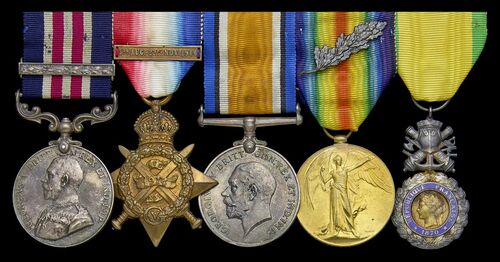
Auction: 24002 - Orders, Decorations and Medals
Lot: 235
A superb Great War ‘French theatre’ M.M. and rare 1919 ‘North Russia Relief Force’ Second Award Bar group of five awarded to Sergeant W. M. Ross, 45th Battalion, Royal Fusiliers, late 1st and 8th Battalions, Royal Berkshire Regiment, who was 'mentioned' in 1914, earned the Medaille Militaire in 1915 and during his service in North Russia was wounded in action
Military Medal, G.V.R., with Second Award Bar (9691 Sjt W. Ross. 8/R. Berks: R.); 1914 Star, with clasp (9691 Pte W. Ross. 1/R. Berks: R.); British War and Victory Medals, M.I.D. oak leaves (L-9691 Sjt. W. Ross. R. Berks. R.); France, Republic, Third Republic, Medaille Militaire, silver, silver-gilt, and enamel, mounted as worn, minor blue enamel damage to last, otherwise good very fine (5)
Approximately 7 Second Award Bars to the M.M. awarded in North Russia.
M.M. London Gazette 13 March 1919.
Second Award Bar to M.M. London Gazette 3 January 1920.
William M. Ross was born in 1887, a native of Warwick prior to attestation. It is possible as a pre-war regular he is the William Ross who appears on the 1911 census, born at Warwick in 1887 and serving with the 1st Battalion in Bombay at the time.
Entering the Great War in France on 13 August 1914 they saw action for the first time at Maroilles before participating in the Great Retreat. Halting at Le Poteau they began to advance again, seeing fighting at the Aisne and eventually the 1st Battle of Ypres. It was around this time that Ross received a 'mention' for his services, the first of many awards to follow (London Gazette 19 October 1914, refers).
The next year he was further awarded the French Medaille Militaire on 24 July 1915, the award document for which states that he was still serving as a Private in the 1st Battalion. Later advanced Sergeant Ross joined the 8th Battalion at some stage before the last months of the war. He was certainly with the Battalion during the final months of the war when they saw heavy fighting through the Hundred days starting at Gressaire Wood.
They were later to be ordered to La Boiselle where they helped to capture the crater and from thence to Trones Wood. The Battalion War Diary notes that Ross' first award of the M.M. was made in October 1918 where the 8th Battalion saw fighting at L'Eveque Wood and Mount Carmel.
Following the close of hostilities Ross volunteered for service with the North Russia Relief Force in 1919, and was posted to the 45th Battalion, Royal Fusiliers with the service number 129640. Along with their sister unit the 46th Battalion, Royal Fusiliers, this formation had been created specifically for service in North Russia.
Ross subsequently served during the Allied Intervention in North Russia and likely saw action during the 'Dvina Offensive' of 10 August 1919. The largest battle fought by British troops against the Soviet Red Army during British military intervention in the Russian Civil War. The attack proved difficult as the main Bolshevik base at Kotlas couldn't be reached by river, instead the attack docused 20 miles downriver on Seltso and Borok. The Bolshevik's lost six Battalions including 2,000 made prisoner and 18 guns taken, the advanced was an enormous success.
The 45th Battalion was at the forefront of the action, earning two V.C.'s during the engagement - Corporal Arthur Sullivan, an Australian volunteer also serving with the 45th Battalion, Royal Fusiliers was awarded the Victoria Cross; or for an attack against a Red Army battery position near the village of Emtsa on the Archangel-Vologda Railway Front on 29 August 1919, which resulted in a further posthumous Victoria Cross being awarded to Sergeant Samuel Pearse, another Australian volunteer serving with the 45th Battalion, Royal Fusiliers.
It is small wonder then that they suffered the highest losses of any British unit in Archangel command, 6 officers and 31 men killed and 7 officers and 63 men wounded. Ross was one of the latter, likely injured during the attack on the Dvina which accounts for the majority of the units' casualties.
Despite their success British troops were withdrawn from North Russia in October 1919 just as the Dvina River and the White Sea were freezing over. The North Russia Relief Force and the short lived 45th and 46th Battalions, Royal Fusiliers, were disbanded the following month, having gained the Battle Honour 'Archangel 1919'.
Sold with an original Bestowal Document for the Medaille Militaire, dated 24 July 1915 as well as a copy of Bolos & Barishynas, The North Dvina 1919 and a quantity of copied and typed research.
Subject to 20% VAT on Buyer’s Premium. For more information please view Terms and Conditions for Buyers.
Sold for
£1,800
Starting price
£1100




